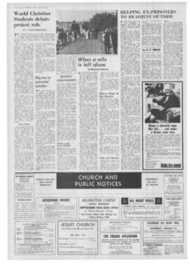Page 8, 24th July 1970
Page 8

Report an error
Noticed an error on this page?If you've noticed an error in this article please click here to report it.
Tags
Share
Related articles
Where 3,000 Called To Ask For Help
In The Last 10 Years The Number Of Female Prisoners
Time For Action Between Parishes And Prisoners
Htioxer1 , 444
Do We Help Vietnam Victims?
HELPING EX-PRISONERS TO READJUST OUTSIDE
by F. C. PRICE
I
N 1968 the average daily prison population of England and Wales was 32,461, an increase of almost 2,000 over the three preceding years.
Considering that the vast
majority of these prisonersprobably in excess of 90 per
cent-were serving sentences at under three years, it means that somewhere in the region
of 50,000 people saw the inside of a prison cell during that calendar year.
Leaving aside the urgent orisis of overcrowding, this presents one of the major social problems of our time. For some it is their one and only spell in gaol: others re turn frequently. But, whatever
the case, the ex-prisoner inevitably faces immense reha bilitation problems on his release. Often it is a failure to solve these that leads to a further prison sentence. It was to help in this sphere that the Catholic Prisoners'
Social Service (formerly the Catholic Prisoners' Aid Society) was formed. Despite its sterling work, it remains one of the least well known Catholic organisations, probably
because most of us, fortunately, never have need of its help.
Its secretary. Mr. R. Shel=dine, told me: "The type of problems we come up against are many and varied, but the major ones are accom
modation, employment, marital, drug addiction and alcoholism."
Commenting on these the report for the year ending last December, which will be pre
sented to the annual general meeting in London on July 2, states: "In an ideal climate of public opinion. a man of average ability who is free from serious personal prob lems and has emerged unscathed from a term in prison, should have no great difficulty in resuming his place in society. if he has the will to do so. "Unfortunately, things do not usually work out in this
way. In practice. society does not seriously believe that 'the slate has been wiped clean' by a prison sentence, and maybe also a fine.
"In different ways it shows its continued disapproval and distrust. and indicates that as yet it is prepared neither to forgive nor to forget.
"For his part, the exprisoner may emerge con firmed in his anti-social and criminal tendencies or with a variety of personal problems that make rehabilitation very The basis of the work done by the Catholic Prisoners' Social Service rests on the
interview plus the necessary follow-up work. Commenting on this the report continues: "After-care should not be a self-perpetuating process, but should be orientated towards the ex-prisoner's eventual self reliance and independence. When. with help, he has
reached a position of basic security, no help often be comes the best help."
During 1969 there were over 1,200 callers at the office in Uxbridge Road, Shepherd's Bush. Of these approximately 800 men came after discharge from ':he London prisons. Two hundred and twelve were from Brixton, where they had been on remand, 380 from PentonOle after serving short sentences, 85 from Wandsworth
and 123 from Wormwood Scrubs.
A further 400 made their way to Uxbridge Road following discharge from provincial prisons. The largest contingent arrived from Maidstone (36), followed closely by Eastchurch (33), Barlinnie (27), and Camp Hill, Isle of Wight (23).
A geographical breakdown showed that approximately 900 lived in the South of England prior to serving their sentences, 65 came from the Midlands, 75 originated from the North, 80 from Scotland and 40 from Ireland. 120 men were visited in prison before the termination of their sentences.
Some cases were referred to the Catholic Prisoners' Social Service by Catholic chaplains, prison welfare officers, parish priests, the S.V.P. and other organisations.
In some instances the problems were rent arrears or electricity arrears. In others clothing or furniture were required. Some wore referred to specialist agencies dealing with particular problems or to the W.V.S. for help with furniture. One of the greatest problems is that of finding employment for the ex-prisoner. On this difficult question the report states: "From its earliest days our society has stressed the basic necessity for regular employment, but lack of references and the tell-tale blank insurance card arouse suspicions should a man attempt to cover up his prison sentence, while a frank admission usually produces a sympathetic refusal.
"Understandably, too, many single men fall into the trap of casual labour, usually in catering, where few questions are asked, and living precariously from day to day they soon find themselves in serious difficulty if not back in prison."
For married ex-pirisonerts who have accommodation problems the Hope Housing Association has been established by the C.P.S.S. Currently this subsidiary body has acquired property in Hammersmith which is being converted into flats.
"So far 34 men have passed through or are now resident. Five men have been to the house on Home Leave from prison for periods of three days and three have returned or will return to stay as residents. Only one resident has so far returned to prison."
blog comments powered by Disqus









